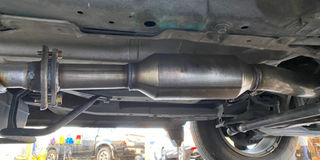Ask the Mechanic

Catalytic converters are most commonly applied to exhaust systems in automobiles. PHOTOS/internet
HOW CAN I KNOW IF MY HARRIER’S CATALYTIC CONVERTOR NEEDS REPLACEMENT
Paul, I drive a Toyota Harrier 2005 with a 2.4 litre engine. Recently, it started showing the check engine light and the sound of the engine became deeper. The mechanic at a service bay told me that the catalytic convertor is damaged or stolen. Do I need to replace it, how important is it? How can I know if my catalytic convertor is not working well?
Muhammed T.
Hello Muhammed, catalytic convertors are devices designed to chemically reduce the pollutant gases in the emission system. Catalytic convertors (CATS) can be damaged or blocked when you use counterfeit oil or contaminated fuel.
CATs will burn or implode when a faulty ignition system dumps unburnt fuel into the emission system.
CATs also fail when their ceramic honey comb (with minerals palladium, rhodium) are stolen or swapped with fake netting which eventually melts and blocks the exhaust path. When exhaust smoke is blocked, it will affect the combustion system as well as damage piston rings which leads to reduced performance and poor fuel economy.
Symptoms of CATs failure include poor ignition or engine stalling, poor acceleration and fuel efficiency, emission system fault check engine light displays and, in extreme cases, a foul ammonia like smell (in case its damaged) or a change in the exhaust sound (if CAT is stolen).
About converter
A catalytic converter is an exhaust emission control device that converts toxic gases and pollutants in exhaust gas from an internal combustion engine into less toxic pollutants by catalysing a redox reaction. Catalytic converters are usually used with internal combustion engines fuelled by petrol or diesel, including lean-burn engines, and sometimes on kerosene heaters and stoves.

MY CAR IS MISFIRING ALL OVER AGAIN AND LACKS POWER
My Nissan X Trail ignition coils have failed less than five months since I replaced them with quality used ones from town. The seller cannot explain why. My car is misfiring all over again and lacks power. What could have caused their failure?
Hamuza. A
Hello Hamza, the most common cause of ignition coil premature damage is bad spark plugs. You ought to have checked their condition at the time you replaced the ignition coils.
Spark plugs supply the spark that ignites the air fuel mixture to power your car engine.
Besides affecting the performance of the engine (surging, loss of power and misfiring) bad spark plugs will also cause damage to other engine components such as coating of large deposits of unburnt fuel on pistons and valves. In your case the bad spark plugs can cause voltage overload which prematurely damages the ignition coils.
Another cause of ignition coil failure can be the purchase of used ignition coils with a short-lived lifespan.
MY TOYOTA PREMIO 2004 MODEL HAS RECENTLY STARTED TO SHOW ‘CHECK ENGINE’ LIGHT
Hello, I drive a Toyota Premio 2004 model that has recently started to show the ‘check engine’ light occasionally. I took it for diagnosis and I was told that it has a rich fuel mixture, that is causing black soot on the spark plugs, and thus the ‘check engine’ light. Spark plugs, mass air flow sensor and the clogged fuel filter/pump were all changed and the check engine light did not appear for about one week of driving but then it returned eventually. Kindly advise on what I can do to fix this. Best regards.
Daniel Agaba
Hello Daniel, your mechanic or service provider ought to consider other factors that affect the ratios in the fuel air mixture.
The ratio of fuel and air is crucial for total combustion during engine running. Ultimately, this affects efficiency and performance of your car’s engine.
A persistent rich mixture of fuel and air can damage engine intake valves and pistons by causing excessive build up of deposits from crusting of un-burnt fuel. When the ratio of fuel to air is lean you need to look for factors curtailing fuel pressure, whereas a rich fuel air mixture is one where there is more fuel in the mixture causing a distortion of recommended ratio.
In the case of your Toyota, inspect the hoses in the vacuum system which may develop hairline cracks or may have a loose connection. Look out for faulty fuel injector(s) which can deliver unregulated amounts of fuel.
A dirty air cleaner will reduce the amount of air in the mixture while a bad oxygen sensor will give wrong values to the engine computer and lead to delivery of excessive amounts of fuel.
Send sms: mycar (space) your comments and questions to 6933
Or email them to: [email protected]




